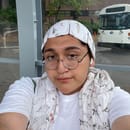In light of the ongoing violence against the Black community, we have been forced to confront our complacency with systems of oppression — police brutality, capitalism, exploitation of Black labor — and one of the key figures to look to for inspiration and theory is the radical activist Angela Davis (1944 – ). Davis has had a fruitful career with combating the American government and the racist capitalist systems that keep it functioning, one of her most prominent actions being her involvement with the Black Panther Party and their own radical activism. Also functioning as an author and academic, Davis has learned from prominent voices such as Marx, Lenin, Fanon and other communist thinkers, using her acquisition of knowledge to develop her own theories on capitalism’s exploitation of Black people, prison abolition and Black women’s intersectional experiences within racist and sexist structures, for example. I, myself, have lent much of my own interactions with American oppression to the thought of Angela Davis, and I also look up to her as a powerful Black queer woman that has shaped the minds of so many queer young adults and future radical activists. (A few books to check out by Davis include Are Prisons Obsolete?, Women, Race and Class, and Angela Davis: An Autobiography.)
Audre Lorde (1934 – 1992), another Black queer woman, has faced tremendous recognition for her own radical work within fields such as feminist studies and ethnic studies; granted, Lorde’s thoughts and literature should have always been recognized and validated, but it’s also important to acknowledge the value her work presents in contemporary thought. One of Lorde’s most prominent essays/speeches, “The Master’s Tools Will Never Dismantle The Master’s House,” is a crucial piece to abolitionist feminist theory, placing emphasis on the ability of queer people, especially queer women, to work beyond dependence on the neoliberal systems of oppression that keep them locked in a cycle of heterosexist exploitation; in a way, oppressed people cannot use reformist ideals to liberate themselves. Rather, they must utilize liberationist and radical praxis (practice) to free themselves from modes of racist patriarchy. Drawing on her queer identity, Lorde wrote hundreds of poems, essays, speeches, and stories to describe what it meant to be Black, queer and a woman in America, pioneering intersectional thought in literature in a time when such experiences were not considered “popular” but “radical.” (Some of her work to check out: Sister Outsider, Zami, The Cancer Journals, and The Collected Poems of Audre Lorde.)
These two wonderful minds are not the only ones to explore during Black History Month, but they are good stepping stones to a broadening of radical thought and literature emphasizing Black identity, queerness and radical acceptance of the body in oppressive spaces. Explore! Read! Listen and follow Black queer people! And most importantly, support Black queer and trans people!


